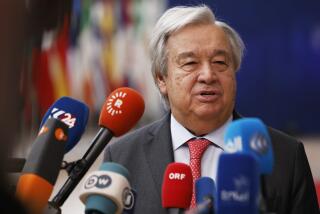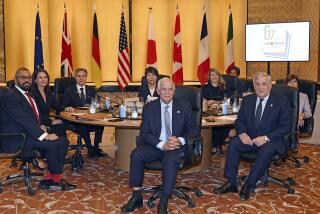Before Attack, Europe Officials Had Urged Restraint on ‘All Sides’
- Share via
THE HAGUE — Meeting hours before the U.S. attack on Libyan targets, the European Communities’ foreign ministers Monday called on “all sides” to show restraint and avoid “further escalation of military tension in the region.”
A joint statement issued at the conclusion of an emergency, seven-hour meeting in this city, the Dutch seat of government, also urged Libya to renounce terrorism and announced that the 12 member states unanimously decided to reduce and restrict Libyan diplomatic personnel on their soil.
Nearly all the foreign ministers had left The Hague when the U.S. attack on Libya began, and there was no immediate reaction from the European governments.
Short of Sanctions
The Common Market action fell short of the drastic diplomatic and economic sanctions urged by the United States, but the statement did go considerably further than the organization’s previous declarations in condemning the regime of Libyan leader Moammar Kadafi.
Some of the Europeans were prepared to go as far as the British, breaking diplomatic relations with Tripoli completely, as the Reagan Administration had urged. But others--Italy and Greece in particular--were unwilling.
The statement by the 12 ministers warned simply that the governments would “consider whether further measures may need to be taken” and declared that “no country which lends support to terrorism can expect to maintain normal relations” with Common Market governments.
The emergency meeting was convened almost as much out of apprehension over possible American military action as over the issue of what to do about terrorism.
The ministers concentrated, however, on the problem of gaining agreement on the strongest language and measures possible against Libya. The result, although mild, was stronger than the Common Market’s past resolutions on terrorism, in which Libya was not even been named.
‘Firm, Strong Stand’
“We have taken a very firm and strong stand,” said Dutch Foreign Minister Hans van den Broek, who chaired the meeting. “I would like to point out that most of the victims of terrorism have all been Europeans, which is sufficient reason for us to be extremely alarmed and extremely concerned.
“I hope the American public will be convinced that we take this issue extremely seriously, as the United States does, and we are in favor of concerted efforts to combat terrorism.”
The community’s statement promised “increased cooperation with other states in the field of intelligence and improvement of security measures generally to prevent acts of terrorism.”
It also condemned “outrages like the ones recently perpetrated on the TWA aircraft and in a discotheque in Berlin”--attacks that left six people dead, five of them Americans--as well as “unacceptable threats made by Libyan leaders against member states directly threatening Europe.”
British Foreign Secretary Geoffrey Howe said that it was “crucial that the 12 respond coherently, credibly and with a sense of urgency” on the Libyan question. The statement, he said, did not go as far as Britain has already gone “but a great deal further than the 12 have previously gone.”
‘Straitjacket’ on Terrorism
It was designed, he said, “to put a straitjacket on Libyan and other terrorism, to tell Kadafi to call off terrorism, cease threatening civilization, and if he carries out threats against European governments, he will be met with vigorous and prompt response.”
Britain has already expelled all Libyan diplomats. The other 11 community countries will now be taking steps to reduce the number of Libyans assigned to their diplomatic missions--called “people’s bureaus”--to restrict the movements of those who remain and to tighten up visa requirements and entry procedures for Libyans wanting to travel in Western Europe.
In some cases, the reduction of Libyan diplomatic personnel is likely to be quite severe, but countries with large numbers of their own nationals working in Libya on oil projects and construction work will move more slowly.
Apart from the general statement in which the 12 ministers “underline the need for restraint on all sides,” there was no direct message for Washington from the meeting.
Genscher on U.S. Mission
However, West German Foreign Minister Hans-Dietrich Genscher, who has been particularly vocal in urging the Reagan Administration to avoid the use of military force in Libya, will be flying to Washington today for a meeting with President Reagan.
Meanwhile, a special experts committee of the 12 Common Market states is continuing work in The Hague on coordinated measures, both in intelligence and security operations, as well as listing further actions to be taken directly against Libya if terrorist acts against Europe erupt in the near future.
More to Read
Sign up for Essential California
The most important California stories and recommendations in your inbox every morning.
You may occasionally receive promotional content from the Los Angeles Times.













